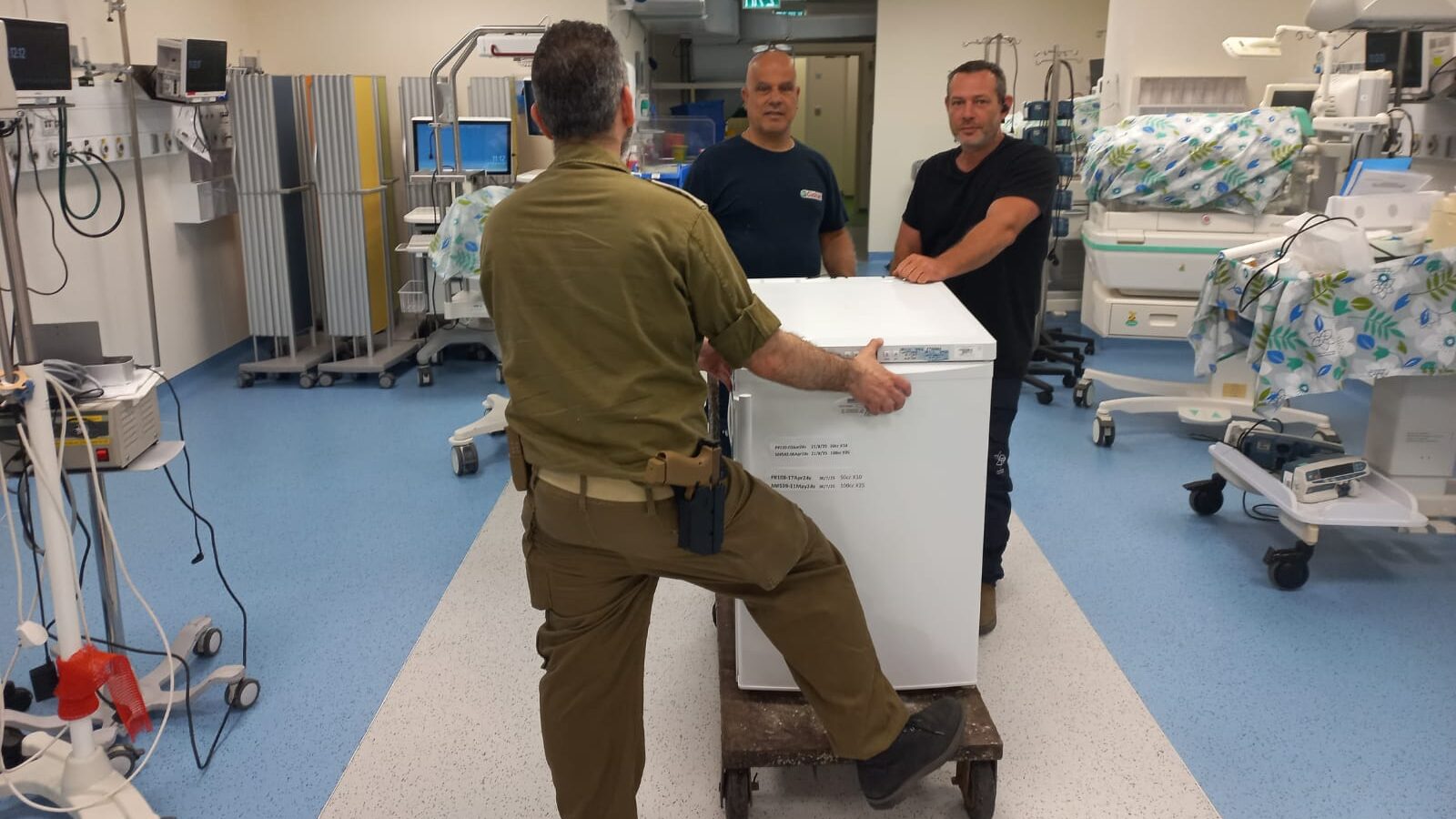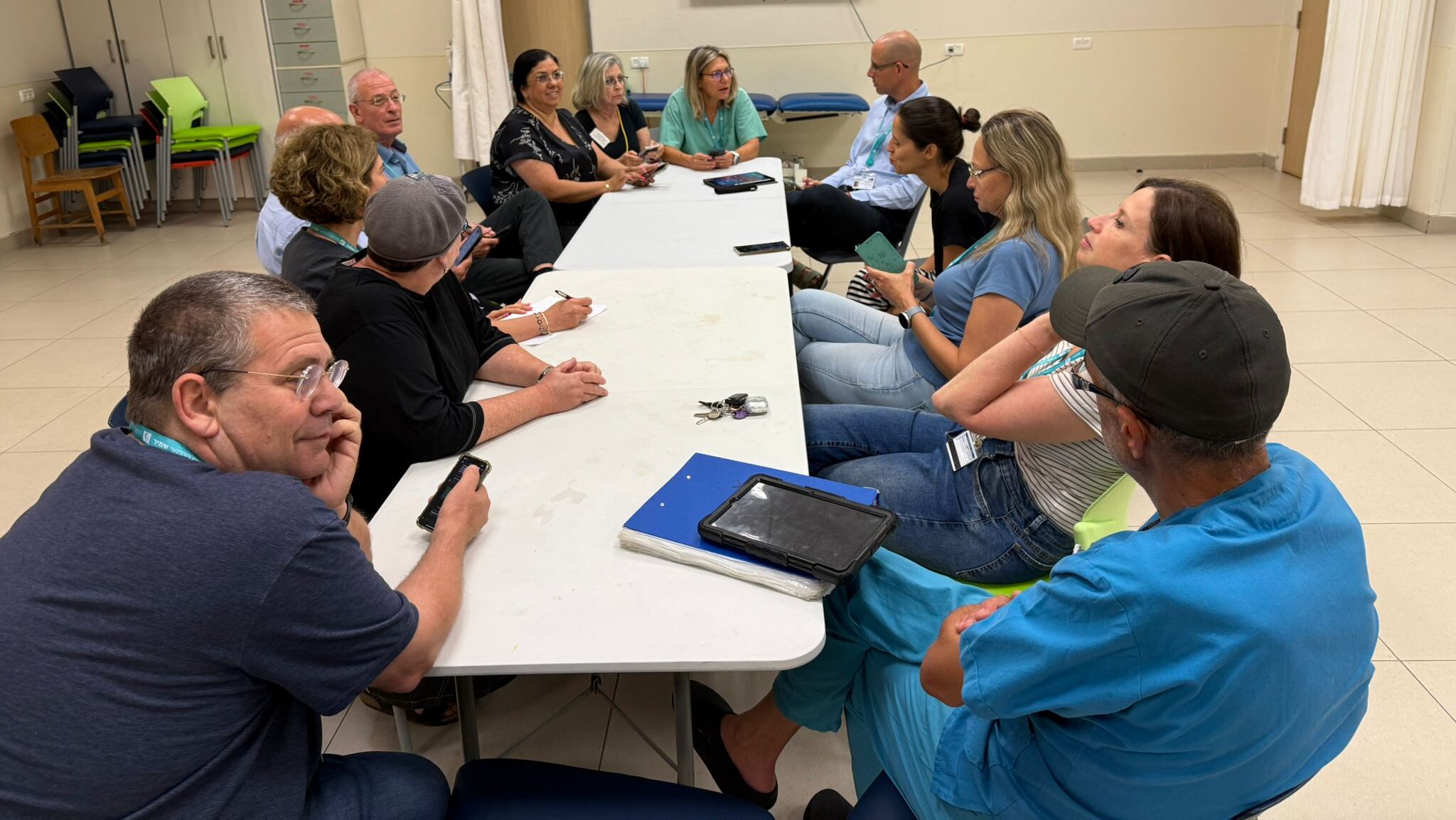Hospitals across Israel have shifted back into emergency mode, moving operations underground as the country braces for an expected retaliatory strike by Iran.
Overnight, Israel’s air force launched a sweeping preemptive attack on Iranian territory, targeting key military leaders and nuclear scientists, and striking critical components of Iran’s nuclear program. At around 3 a.m., air raid sirens echoed across Israel, warning of a possible Iranian response. Within minutes, hospital directors mobilized staff, transferred patients to fortified areas, and discharged those stable enough to go home.
A spokesperson for Sheba Medical Center told The Media Line that the hospital began its emergency relocation with the children’s ward.
“We are moving them to the underground facility that we have had before under the maternity wing,” the spokesperson said.
Throughout Friday, Sheba continued relocating patients to protected areas beneath its orthopedic and cardiac units.
Piece by piece, phase by phase, the hospital is being moved underground. The general intensive care unit is already protected, as is the operating room, and the hospital continues to operate as usual.
“Piece by piece, phase by phase, the hospital is being moved underground,” the spokesperson said. “The general intensive care unit is already protected, as is the operating room, and the hospital continues to operate as usual.”
Other hospitals across the country also reported emergency shifts—from the northern border to Israel’s southern regions. Rambam Health Care Campus in Haifa announced that its underground parking lot had been closed to vehicles as part of the national response plan. Its emergency room, however, remained open and fully operational.

Galilee Medical Center in Nahariya moves its neonatal intensive care unit underground on June 13, 2025. (Galilee Medical Center)
The public was asked not to visit unless for urgent medical needs. Rambam said all ambulatory services had been canceled and that existing appointments would be rescheduled.
“The public is asked not to come to the hospital unless it is a medical emergency,” said Ohad Hochman, head of Bnai Zion Medical Center.
One exception is Assuta Ashdod Public Hospital, the newest public hospital in Israel and the only one in the country built entirely from scratch in recent decades as a fully fortified facility. The hospital’s inpatient wards, operating rooms, delivery rooms, clinics, and imaging departments all continue functioning during emergencies without evacuation.
“The fortification of our hospital allows us to continue operating in almost any situation and under any threat,” said Col. (res.) Dr. Erez Barenboim, head of Assuta Ashdod. “Assuta Ashdod Public Hospital is prepared for any scenario.”
Located less than 25 miles from the Gaza border, the hospital opened in 2017 to serve a region regularly targeted by Hamas rocket fire.
None of the hospitals received alerts ahead of time about the emergency situation. Dr. Maor Maman, director-general and CEO of Emek Medical Center in Afula, said that the staff woke up in a start along with the rest of the country.
“All of us woke up with the alarm at 3 a.m. and immediately started to take action and step ahead to the hospital,” Maman told The Media Line. “We received instructions as we arrived at the hospital.”
This holiday season, give to:
Truth and understanding
The Media Line's intrepid correspondents are in Israel, Gaza, Lebanon, Syria and Pakistan providing first-person reporting.
They all said they cover it.
We see it.
We report with just one agenda: the truth.


All of us woke up with the alarm at 3 a.m. and immediately started to take action and step ahead to the hospital.
Maman said most hospitals are trained for emergency situations, especially since the October 7 attacks. Once the sirens sounded, the Home Front Command informed hospital directors of the alert level, triggering immediate action.

Staff at Shamir Medical Center discuss their emergency protocols as Israel braces for a possible missile attack from Iran on June 13, 2025. (Shamir Medical Center)
At Emek, the response included evacuating patients from top-floor departments to secure areas and summoning all department heads to assume leadership roles. A protected war room was activated as the hospital’s central command hub, allowing leaders to manage operations in safety.
“Every hour and a half or so, we gather all the managers of the hospital, look at the data, and send instructions to our staff,” Maman said.
In tandem, Emek worked to discharge patients who no longer required hospitalization. “If they don’t need to be in hospital, it is essential to begin discharging them,” Maman said. While most of those discharged were already scheduled to leave on Friday, staff expedited paperwork and releases—even overnight.
In the emergency department, staff reviewed existing patients, relocated those who could be moved, and discharged others when possible. Surgeons were placed on-site or on-call, though many were not scheduled to work due to the weekend.
Logistics teams ensured adequate supplies, including medical gases like oxygen and carbon dioxide, and confirmed that backup generators had sufficient fuel. Food and blood stocks were also checked.
According to Maman, Emek already had most supplies in place. “We do not know when the next escalation will occur,” he said, adding that the hospital maintains a two-month fuel reserve and a one-month supply of medications—a standard now in most Israeli hospitals.
“We sensed in the last few weeks that we were going there, so we were on high alert,” Maman added. While not privy to classified details, he said they had heard US President Donald Trump issue a 60-day deadline for a new nuclear deal with Iran, and knew that the deadline had passed.
“We knew something might happen, and our responsibility is to be prepared,” he said.
Two weeks ago, the hospital republished its map of secure areas in anticipation of conflict.
Given its location near the northern border with Lebanon, Emek has spent the last 20 months reinforcing infrastructure. Since October 7, the hospital has added 150 beds in protected spaces to ensure patient safety.
It also opened 10 new fortified operating theaters two weeks ago.
If the attack were two weeks ago, then I was much more worried because the operating rooms were not fully protected. Now, we are working in protected areas.
“If the attack were two weeks ago, then I was much more worried because the operating rooms were not fully protected,” Maman said. “Now, we are working in protected areas.”
He continued, “Unfortunately, we are experienced from the last months. I am quite confident in my team—that they know how to do the work and manage themselves in this situation.”
Part of the country’s training has focused on teaching hospitals to operate in isolation, capable of functioning without help from the Health Ministry, the Home Front Command, or neighboring hospitals.
Yet regional cooperation systems also exist. If one hospital is hit, it can call in extra physicians or nurses from others. These support teams, or “capsules,” are deployed within minutes in the event of an attack.
Throughout Friday, the Israeli military and Ministry of Health stayed in close touch with hospitals to help coordinate their response. Between 3 a.m. and 11 a.m., two Zoom briefings were held—one with the Home Front Command and another with the ministry—sharing assessments and recommendations.
The Home Front Command also sent officers to hospitals to assist with transferring patients to fortified areas.
Outside hospital walls, national emergency medical services also sprang into action.
Thousands of Magen David Adom volunteers and staff have stepped up immediately. Our emergency system is fully prepared for any scenario, and we are working in close coordination with all security and emergency forces. This cooperation is critical to saving lives.
“Thousands of Magen David Adom volunteers and staff have stepped up immediately,” Magen David Adom Director-General Eli Bin said. “Our emergency system is fully prepared for any scenario, and we are working in close coordination with all security and emergency forces. This cooperation is critical to saving lives.”
After Israel’s strike on Iran was announced, Magen David Adom raised its alert level to the maximum. All 35,000 personnel were activated to provide rapid response wherever needed. The emergency response organization emphasized that it routinely holds large-scale drills and that teams are trained to act quickly and effectively under pressure.
ZAKA, an emergency response organization focused on search and rescue, made a similar announcement.
“From the moment the operation began, hundreds of ZAKA volunteers mobilized,” ZAKA head Zvi Hassid. “Over the past year, we’ve held targeted drills for emergencies, and we are fully prepared to respond as needed. The organization is operating in full coordination with all security and emergency agencies.”
Magen David Adom also activated its national blood services reserve and brought in more medical staff. Blood collection was scaled up across the country, with special centers opened for donations. The public, especially those with type O blood, was encouraged to contribute.
In parallel, many of Israel’s health funds suspended routine services. Urgent care was redirected to providers like Terem, which kept essential clinics open nationwide.
As Maman summed it up, “Prepare for the worst, hope for the best”—a mindset guiding Israel’s hospitals as they face an uncertain weekend.